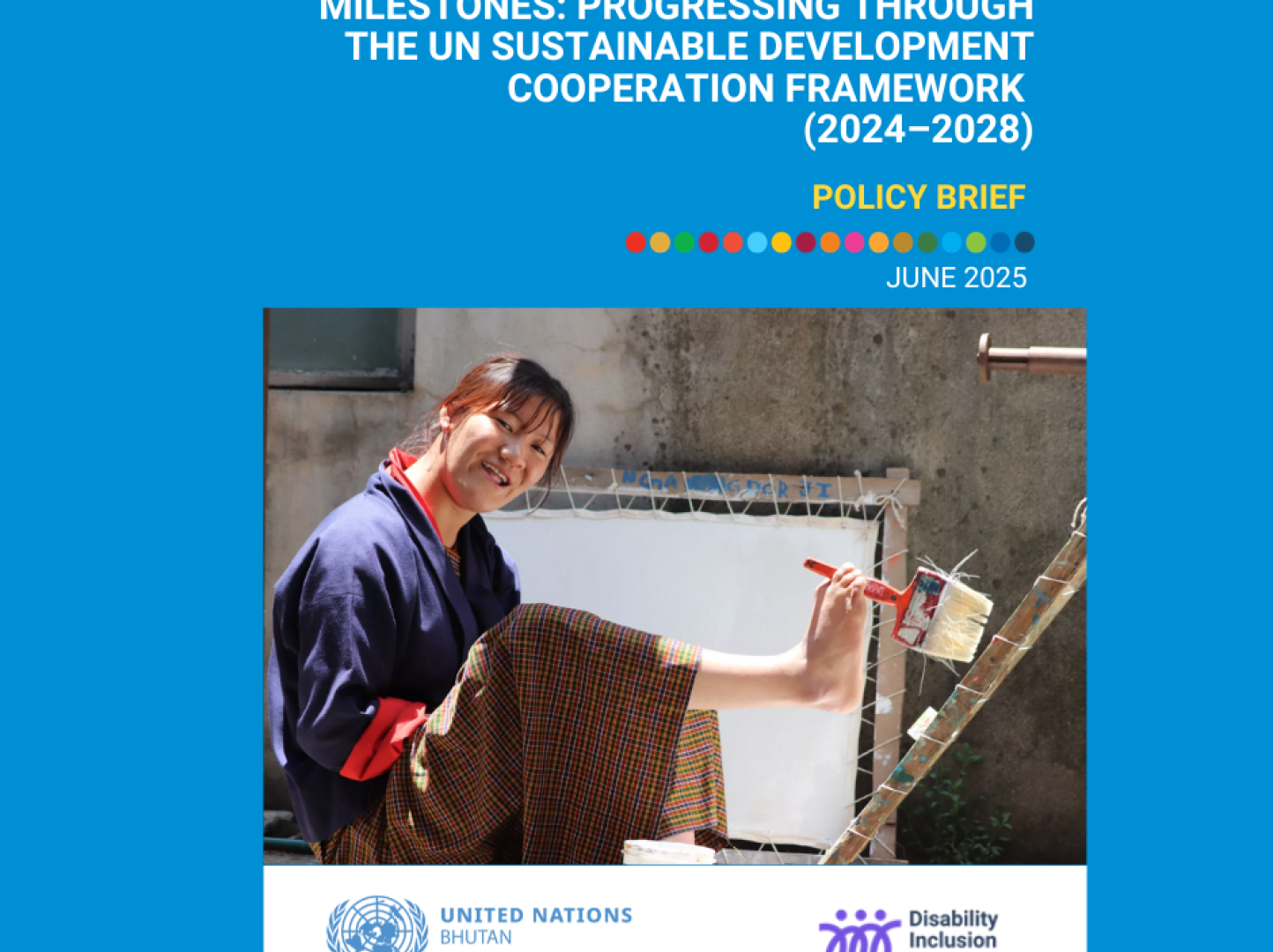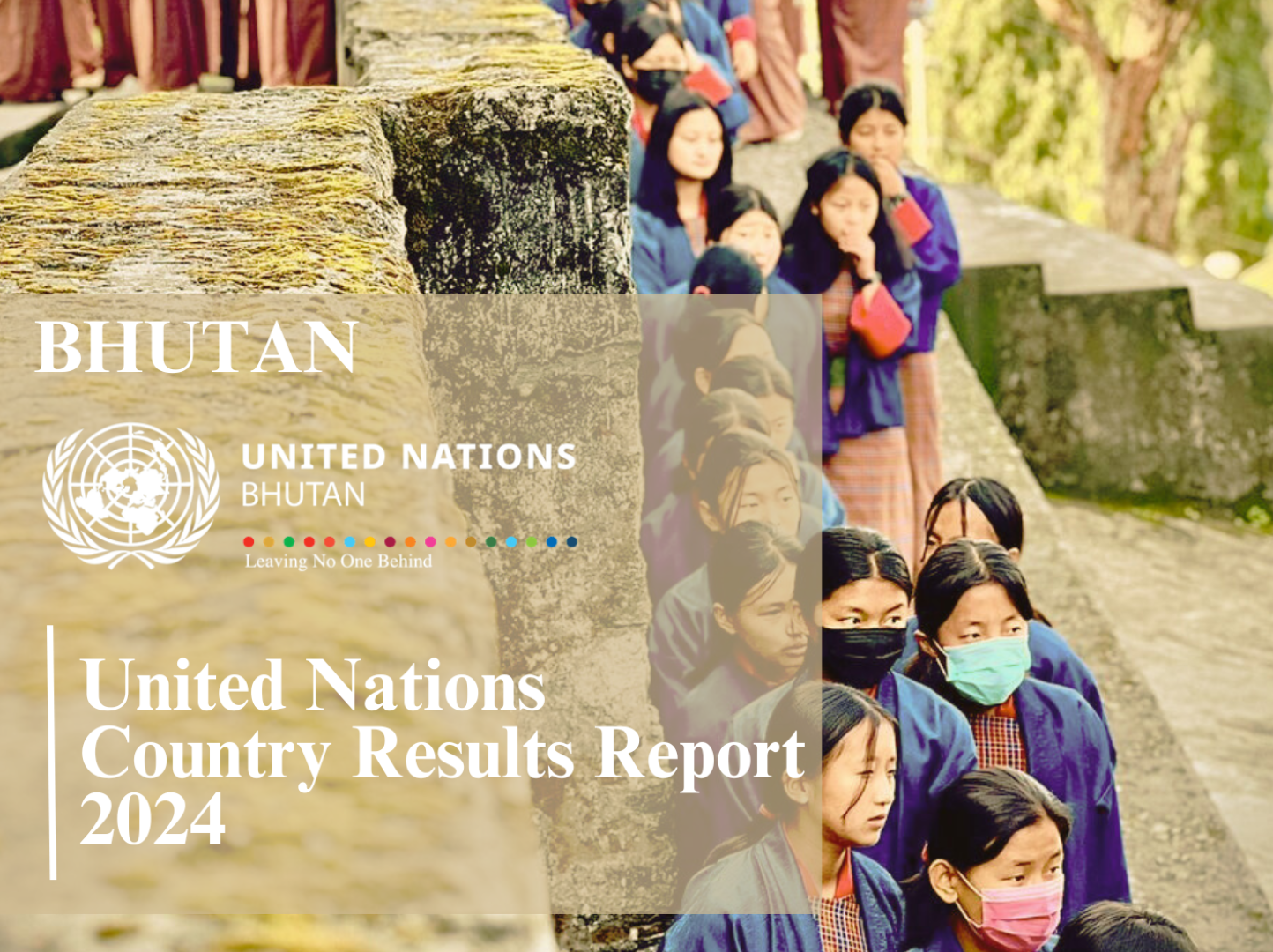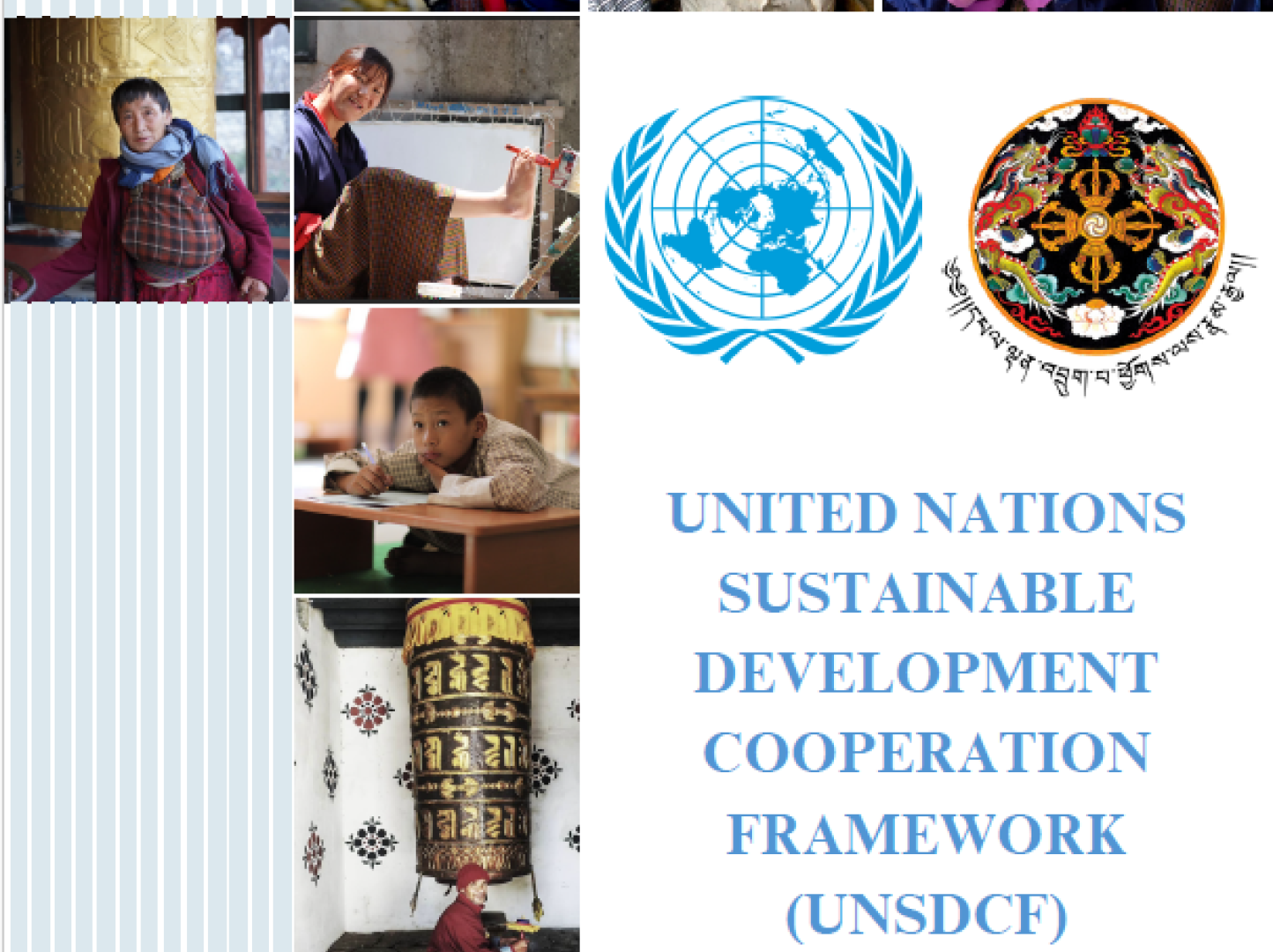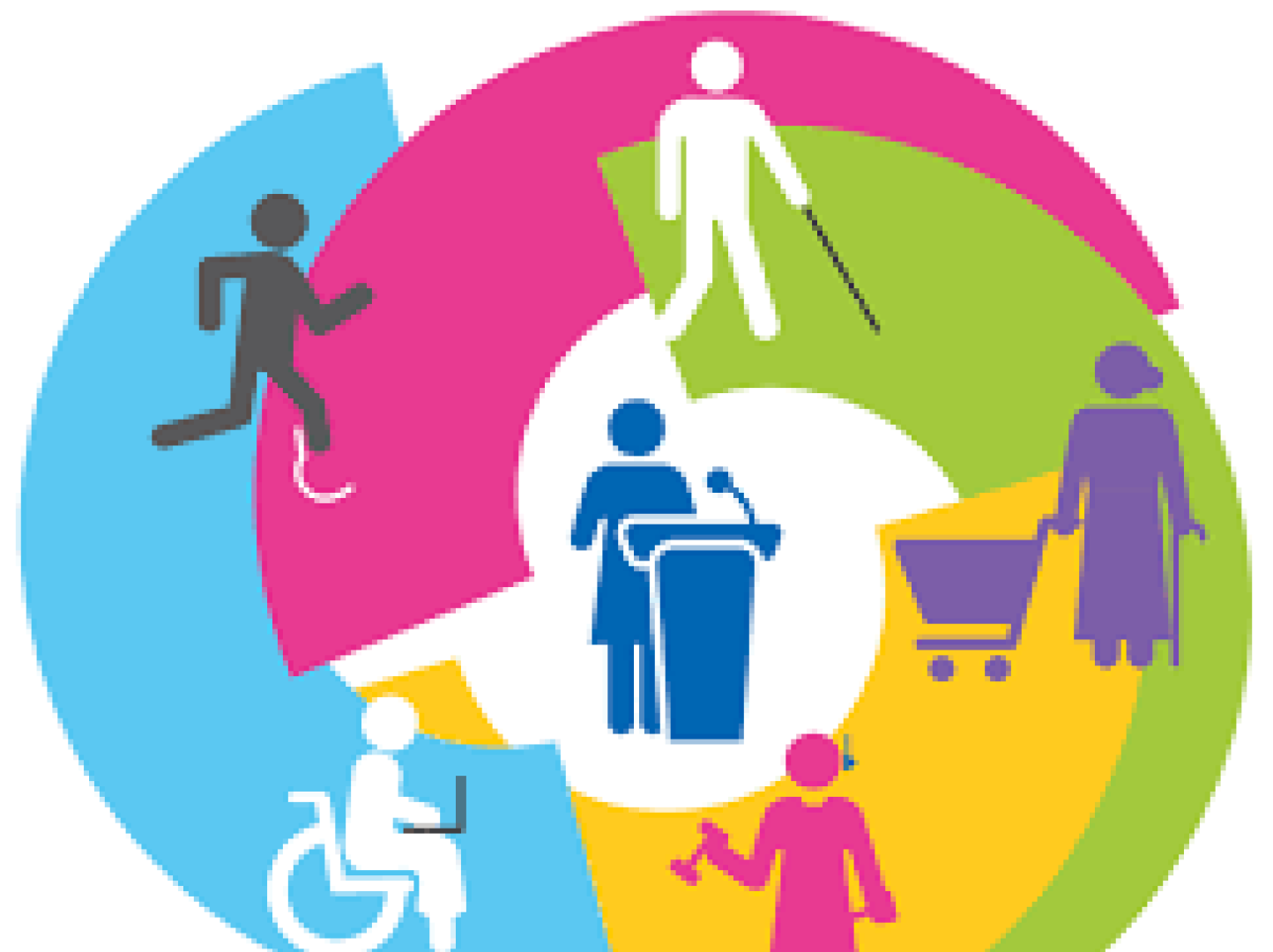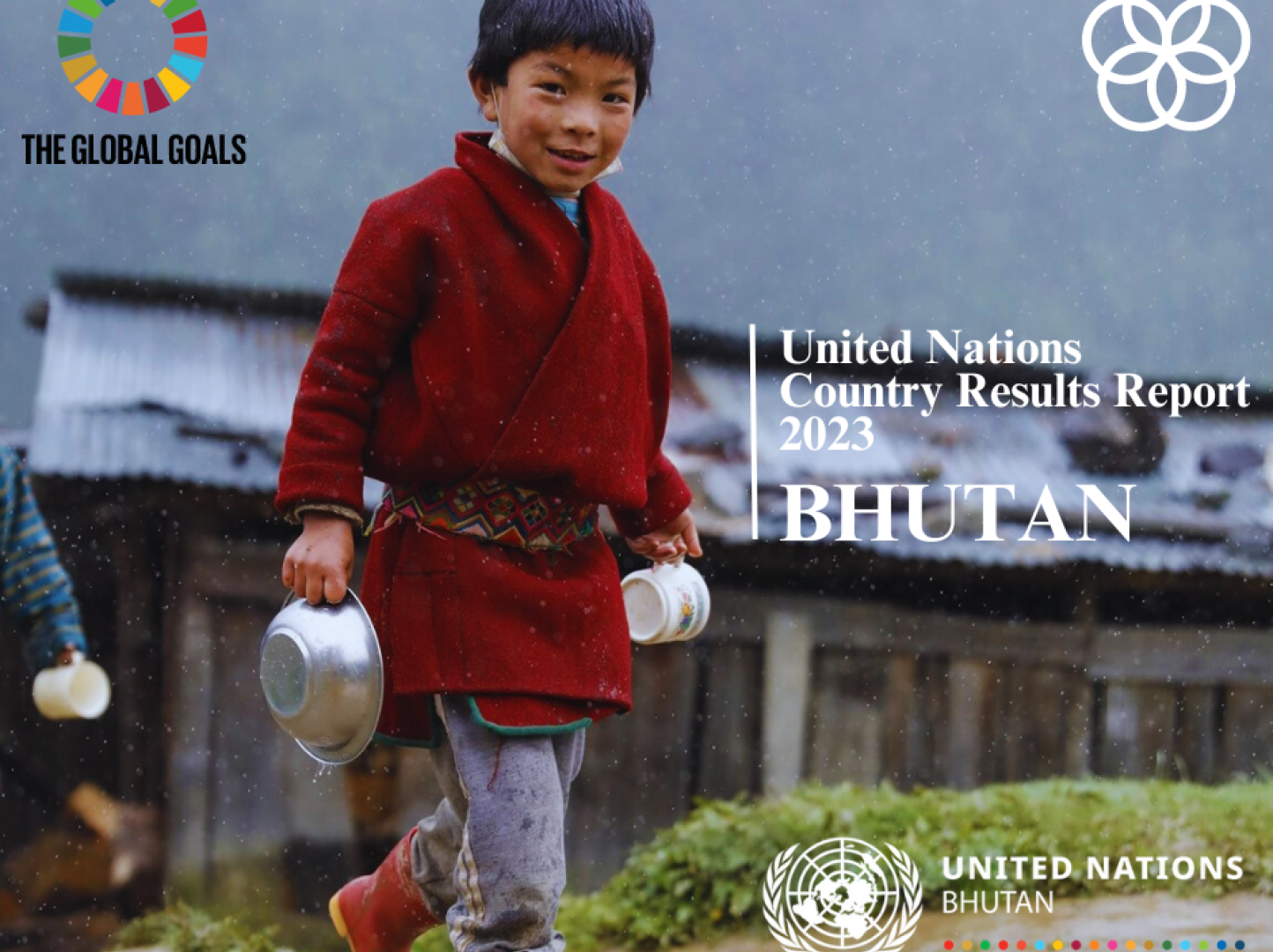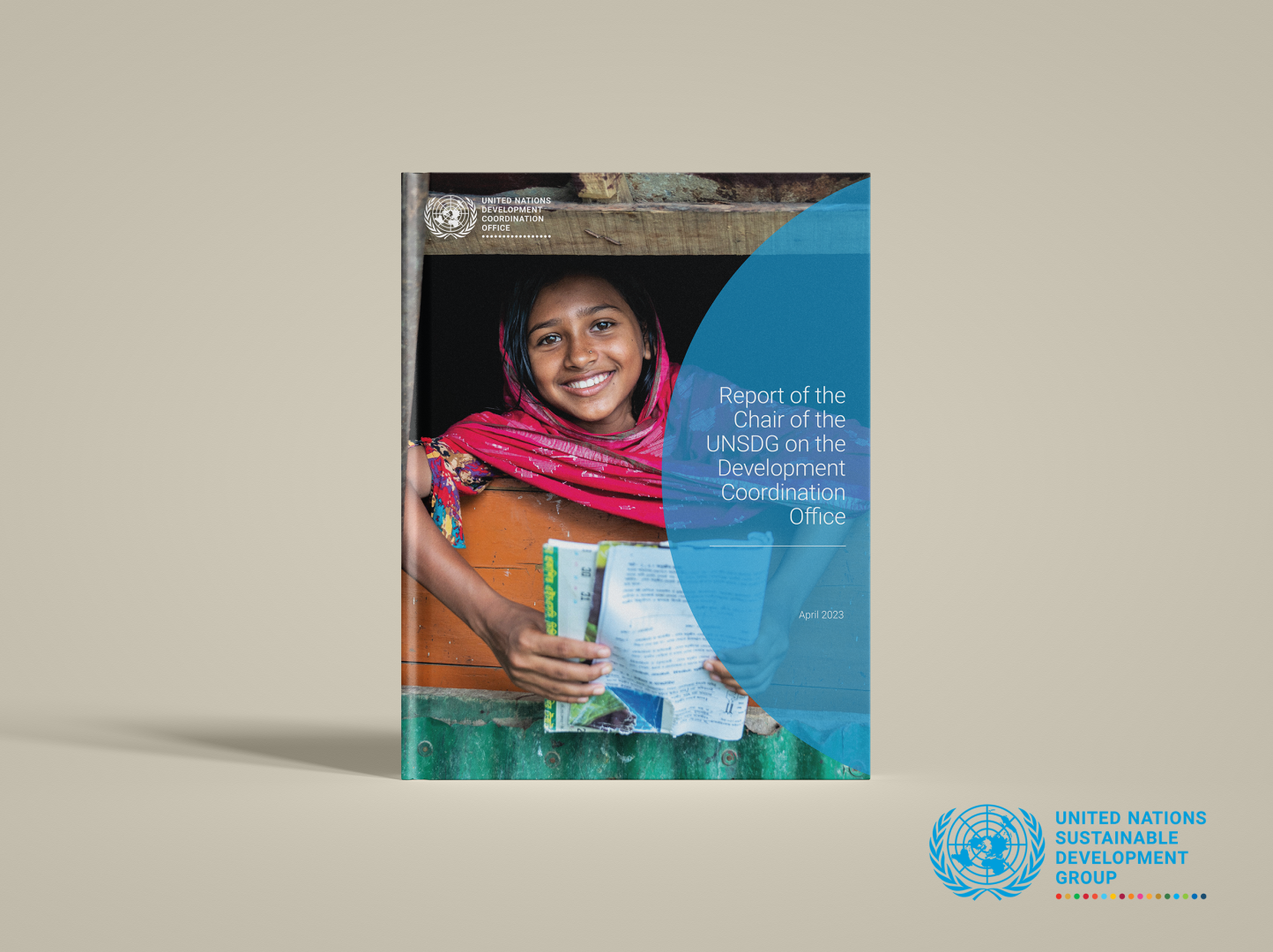Latest
Story
15 December 2025
16 Days of Activism 2025: UNiTE to End Digital Violence Against All Women and Girls.
Learn more
Story
03 December 2025
Agenda Chikha: Advancing Disability Inclusion in Wangdue Phodrang
Learn more
Story
07 November 2025
Bhutan SDG Partnership Week Day 3- Closing with Colour, Creativity, and Collaboration
Learn more
Latest
The Sustainable Development Goals in Bhutan
The Sustainable Development Goals are a global call to action to end poverty, protect the earth’s environment and climate, and ensure that people everywhere can enjoy peace and prosperity. These are the goals the UN is working on in Bhutan:
Story
03 December 2025
Agenda Chikha: Advancing Disability Inclusion in Wangdue Phodrang
The meeting brought together local government leaders, civil society organisations, monastic representatives, development partners, and United Nations agencies to review progress, address emerging challenges, and agree on next steps under Agenda Chikha, Bhutan’s joint disability inclusion initiative (2024–2027).Wangdue Phodrang was selected as the host district both in recognition of its strong local leadership and its relatively high proportion of persons with disabilities . Holding the meeting outside Thimphu reflected Agenda Chikha’s commitment to decentralisation, regional representation, and ensuring that national policies are shaped by local realities. Policy commitments to implementation on the groundParticipants reaffirmed that persons with disabilities in Bhutan continue to face barriers to full participation in social, economic, and civic life. These include persistent stigma, gaps in accessibility, limited availability of disaggregated data, and uneven policy implementation at the local level.Presenting an overview of the national situation, Dorji Phuntsho, a UNV with UNDP, highlighted the importance of strengthening disability data systems and community awareness. He noted that while Bhutan is steadily shifting from a welfare-based approach toward a rights-based framework, sustained progress depends on accurate identification of persons with disabilities, consistent local-level implementation, and continued efforts to address stigma and unconscious bias.Local leadership as a driver of inclusionA central focus of the meeting was the role of local governments and village leaders in advancing disability inclusion. Sharing updates from Dagana and insights relevant to Wangdue, Phurpa Wangchuk, Governance Associate with UNDP, emphasised that decentralised action is essential, as local authorities are often best placed to understand context-specific challenges and implement practical solutions.Gups (local leaders) from Wangdue Phodrang outlined planned and proposed initiatives, including door-to-door consultations with persons with disabilities, the integration of accessibility considerations into construction approvals, relocation of Gewog offices to ground floors, and measures to improve access to cultural and public spaces.Education, livelihoods, and social protectionParticipants underscored inclusive education as a priority, noting that access to learning remains one of the most significant challenges for children with disabilities. The discussion highlighted the need for skilled and trained educators, particularly in areas such as early intervention, inclusive teaching strategies, and support for children with diverse learning needs.Bishnu B. Mishra, Education Officer with UNICEF, emphasised that education should be understood broadly, encompassing formal, non-formal, and informal learning, including basic life skills. Participants also stressed that education must be complemented by livelihood opportunities and social protection in order to enable persons with disabilities to live with dignity.Strengthening inclusion through targeted initiativesThe Steering Committee discussed several initiatives to further strengthen disability inclusion under Agenda Chikha. These included proposals to establish an Agenda Chikha Trust Fund, roll out nationwide training for ECCD facilitators on early intervention and Bhutanese Sign Language, develop an Inclusive Play World (Druk Play World) model, and organise a national Chikha Festival celebrating the abilities and leadership of persons with disabilities.A dedicated session on accessibility audits, introduced standardised tools to assess the accessibility of buildings, services, and communication systems, providing a practical framework to guide inclusive participation.Inclusive workplaces and institutional accountabilitySharing regional perspectives, Milica Markovic, Human Resources Officer (UNDCO Asia-Pacific) , highlighted the importance of accessibility and reasonable accommodation in workplaces. She noted that inclusive environments not only enable persons with disabilities to participate fully and contribute meaningfully, but also strengthen organisational effectiveness through greater diversity and engagement.Marking International Day of Persons with DisabilitiesCoinciding with the global observance of the International Day of Persons with Disabilities on 3 December, participants marked the occasion by hoisting Lung Dar, honouring the contributions of persons with disabilities and reaffirming the collective commitments to inclusion policies into tangible action. Looking aheadThe meeting concluded with key agreements to expand engagement with the private sector, strengthen disability awareness among local leaders to better inform planning processes, and continue holding Steering Committee meetings outside Thimphu to promote regional inclusion. The next Agenda Chikha Steering Committee meeting is scheduled for May 2026.Agenda Chikha continues to serve as a collaborative platform bringing together government agencies, civil society, monastic institutions, development partners, and persons with disabilities to advance a more inclusive and equitable Bhutan.
1 of 5

Story
15 December 2025
16 Days of Activism 2025: UNiTE to End Digital Violence Against All Women and Girls.
For the country's youth, the internet provides unprecedented opportunities for learning, creativity, and connection. Yet, alongside these benefits, women and girls increasingly face online harassment, image-based abuse, deepfake pornography, gendered disinformation, and other forms of digital violence. These harms are not confined to virtual spaces, they carry serious real-world consequences for safety, dignity, mental health, education, and livelihoods. From 25 November to 10 December 2025, Bhutan joined the global 16 Days of Activism Against Gender-Based Violence under the theme “UNiTE to End Digital Violence Against All Women and Girls.” Led by the UNiTE campaign, this initiative calls on governments, communities, youth, media, and institutions to act against one of the fastest-growing forms of violence worldwide.Central to the campaign was the advocacy video “USER67”, which follows the story of Dechen, a young woman targeted by online harassment and image-based abuse. The video illustrates how digital threats spill into everyday life, affecting mental health, safety, and daily routines. On-screen statistics highlights the urgency: globally, 58% of young women have faced online harassment (UNESCO, 2023), while in Bhutan, seven cases of online sexual offences were recorded this year, including AI-generated images. The video reinforces the campaign’s message: “Technology should advance equality, not enable violence.” So far this year, the Royal Bhutan Police have recorded seven cases of sexual offences committed online, most involving blackmail, shaming, and manipulation of teenage girls through AI-generated images and videos. To engage communities most affected by gender-based violence, dzongkhag-level forums were held across six districts: Phuentsholing (28 November), Punakha (4 December), Samdrup Jongkhar (4 December), Trashiyangtse (5 December), Samtse (6 December), and Gelephu (9 December). These sessions were— guided by the NHS 2023 report on Violence Against Women, which highlights how deeply rooted socio-cultural norms perpetuate GBV. Organized in partnership with RENEW, whose Community-Based Service Centres were instrumental in coordinating the forums, and facilitating dialogue, the events used USR67 advocacy video as a focal point. The forums brought together youth, educators, counselors, law enforcement, local leaders, and community members to share experiences, explore reporting and support mechanisms, discuss psychological assistance, and develop strategies to create safer digital spaces. By connecting urban and rural communities, RENEW’s Community-Based Service Centres strengthened the campaign’s reach, ensuring inclusive engagement so that no one was left behind. This approach allowed each session to move beyond awareness-raising, empowering communities to take informed, collective action against digital violence. Across all locations, panel discussions and moderated Q&A sessions explored the real-life experiences of online harassment and its psychological effects, examined reporting mechanisms and legal remedies including the role of law enforcement, and highlighted community-driven strategies to prevent violence and foster safer digital spaces. Sessions also focused on empowering youth to model respectful online behaviour and lead safety initiatives. Participants were encouraged to consider their roles both individually and collectively, turning awareness into concrete actions that promote safer and more inclusive digital environments.The forums revealed key insights: awareness alone is not enough; legal literacy, community engagement, and youth empowerment are essential for sustainable prevention. By sharing knowledge and strengthening dialogue, the sessions empowered communities to create safer, more respectful digital environments. The take-away from the forums will inform future interventions at school, community, and policy levels, creating a safer digital environment for women and children throughout Bhutan.Bhutan’s campaign demonstrated that ending digital violence requires collective responsibility, from youth and parents to educators, law enforcement, and local leaders. By promoting safer digital spaces, amplifying voice, and encouraging community action, the 16 Days of Activism reinforced a critical message, that ending violence against women and girls, online and offline, is a shared responsibility and a fundamental rights imperative.
1 of 5

Story
05 November 2025
Bhutan SDG Partnership Week Opens at Sherubtse College
The second Bhutan SDG Partnership Week opened with a powerful message of unity for gender equality and the empowerment of women. The week-long celebration, jointly organized by Sherubtse College and the United Nations in Bhutan, will celebrate Bhutan's progress toward the Sustainable Development Goals (SDGs). The Grand Opening was graced by the President of Sherubtse College and the UN Resident Coordinator a.i. First launched in 2024 by Her Royal Highness Princess Eeuphelma Choden Wangchuck- President of the Bhutan Paralympic Committee, the Bhutan SDG Partnership Week, is now in its second year, it continues to foster collaboration and celebrates partnerships driving progress for people and planet. The Grand Opening was a reminder that the Bhutan SDG partnership Week is more than an event, it is a reminder that everyone must work together to build a better future where no one is left behind.For Sherubtse College, the week marked a historic moment as Bhutan continues to lead by example in building a sustainable and inclusive society. Mr. Tshering Wangdi, President of Sherubtse College stated: “The Bhutan SDG Partnership Week is more than a series of events—it is a collective call for action and a reminder that real change begins locally, in our classrooms, our towns, and our communities.” Dr. Bhupinder Kaur Aulakh, UN Resident Coordinator a.i., reflected on how Bhutan’s development ethos continues to inspire the world. She emphasized the central role of partnerships in achieving the SDGs, stating that: “Partnerships are the heartbeat of the SDGs. They allow us to connect national leadership with local action, and global ambition with lived realities.” Dr. Aulakh highlighted that the Bhutan SDG Partnership Week is more than just a gathering of stakeholders, it is a living example of Bhutan’s spirit of collaboration, where communities, institutions, and generations come together to shape a shared future. As the United Nations marks its 80th anniversary, she highlighted the importance of collective action to advance gender equality and women’s empowerment, aligning Bhutan’s national values with global priorities.This year's Bhutan SDG Partnership Week embraced the theme of Gender Equality and Women’s Empowerment, reflecting Bhutan's deep-rooted belief in equality as a cornerstone of Gross national happiness. The day's programme highlighted how women's voices, leadership, and contributions continue to shape Bhutan's progress towards a more inclusive and sustainable future. A captivating cultural performance, “Mo-Wong: She Who Came Forward”, by the Sherubtse Cultural Club, paid tribute to the courage of women who challenge harmful gender stereotypes and inspire transformation within their families, communities, and the nation. It set the tone for reflection on Bhutan's evolving gender landscape, one where women have historically played central roles in managing households, land, and community life, yet continue to navigate new challenges in a modernizing economy. In her speech titled “A 21st Century Woman,” Ms. Kinley Paldon, Vice Coordinator of the Sherubtse GNH Club, captured the spirit of the theme. She spoke passionately about the changing roles and aspirations of women in contemporary Bhutan and the shared responsibility of both women and men in building a just and equal society. Her words reinforced that empowering women is not only about equality, but also about unlocking Bhutan's full potential for development and progress. “Today, the 21st-century woman writes her own story, boldly, unapologetically, and on her own terms…Empowerment is not about women rising above men, but about humanity rising together.”The morning also featured the launch of the Sherubtse Gender Allies Initiative, under the Sherubtse UN Club, which is a student-led movement to promote equality, respect, and empathy on campus. The initiative was symbolically launched through the unfurling of “The Weaving Loom”, a wooden artwork created by Bhutanese artist Mr. Pema Tshering, a person with cerebral palsy. Using only his feet, Pema carved the loom to represent unity and balance. The Weaving Loom serves as a reminder that, like the warp and weft of a loom, men and women together form the strong fabric of a just society. Ms. Jigme Wangmo, Coordinator of the Sherubtse UN Club stated: “You’ve reminded us that young people have the power to make real change, today, not just in the future…Every little action we take can make a big difference.”The grand opening closed with the vote of thanks delivered by Mr. Sonam Tobgay, President of the FINA club at Sherubtse college. He stated: “This week reminded us that youth are not just participants but active partners in building a sustainable and equitable future for all.” The celebrations continued with the SDG Champions Parade, an Olympic-style march featuring students representing each of the 17 Goals. Marching under brightly coloured banners, the parade reflected the energy, creativity, and leadership of Bhutan's youth. Each group carried banners, props, and costumes representing their respective goals, while the crowd cheered in support. The parade symbolized not only awareness but also action, a reminder that progress happens when everyone contributes. The parade was complimented by the unfurling the Bhutan SDG Partnership Week flag, featuring a logo inspired by the global SDG wheel, with SDG 17 (Partnerships for the Goals) at its centre. The flag symbolizes unity, diversity, and Bhutan’s collective commitment to sustainable development. The flag-off also marked the beginning of the SDG Ball Games, a fun and inclusive sporting event aimed at promoting teamwork and healthy living.The Bhutan SDG Partnership Week promises a vibrant line-up of activities, from youth dialogues and panel discussions to art drive, community clean-ups, and a grand SDG Concert. Each event reflects a shared vision, that sustainable development begins with people, their ideas, actions, and unity in purpose.As the opening day concluded, the spirit of collaboration and shared purpose was evident across the Sherubtse campus. The Bhutan SDG Partnership Week 2025 underscores how progress toward the Goals is strongest when built on inclusion, dialogue, and collective effort.
1 of 5
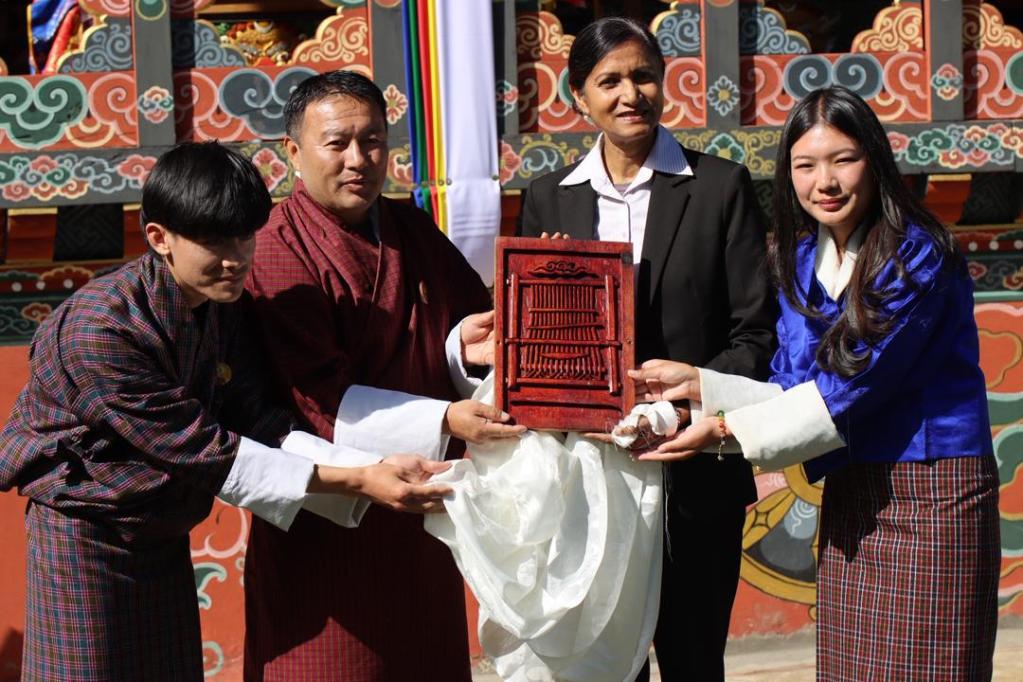
Publication
01 April 2025
BHUTAN UN Country Results Report 2024
The Bhutan UN Country Results Report 2024 showcases the United Nations’ collective impact in supporting Bhutan’s sustainable development journey. In a year marked by the launch of the 13th Five-Year Plan, a new government, and deeper global engagement, the UN in Bhutan has worked closely with the Royal Government, development partners, and civil society to drive progress across key areas.From advancing economic diversification and digital transformation to strengthening climate resilience, social inclusion, and universal health coverage, 2024 has been a year of meaningful achievements. Notably, the UN has deepened its focus on disability inclusion, youth empowerment, and green finance, ensuring that no one is left behind.This report highlights our shared successes, reflecting Bhutan’s unwavering commitment to the 2030 Agenda for Sustainable Development and the power of partnerships in driving positive change.
1 of 5
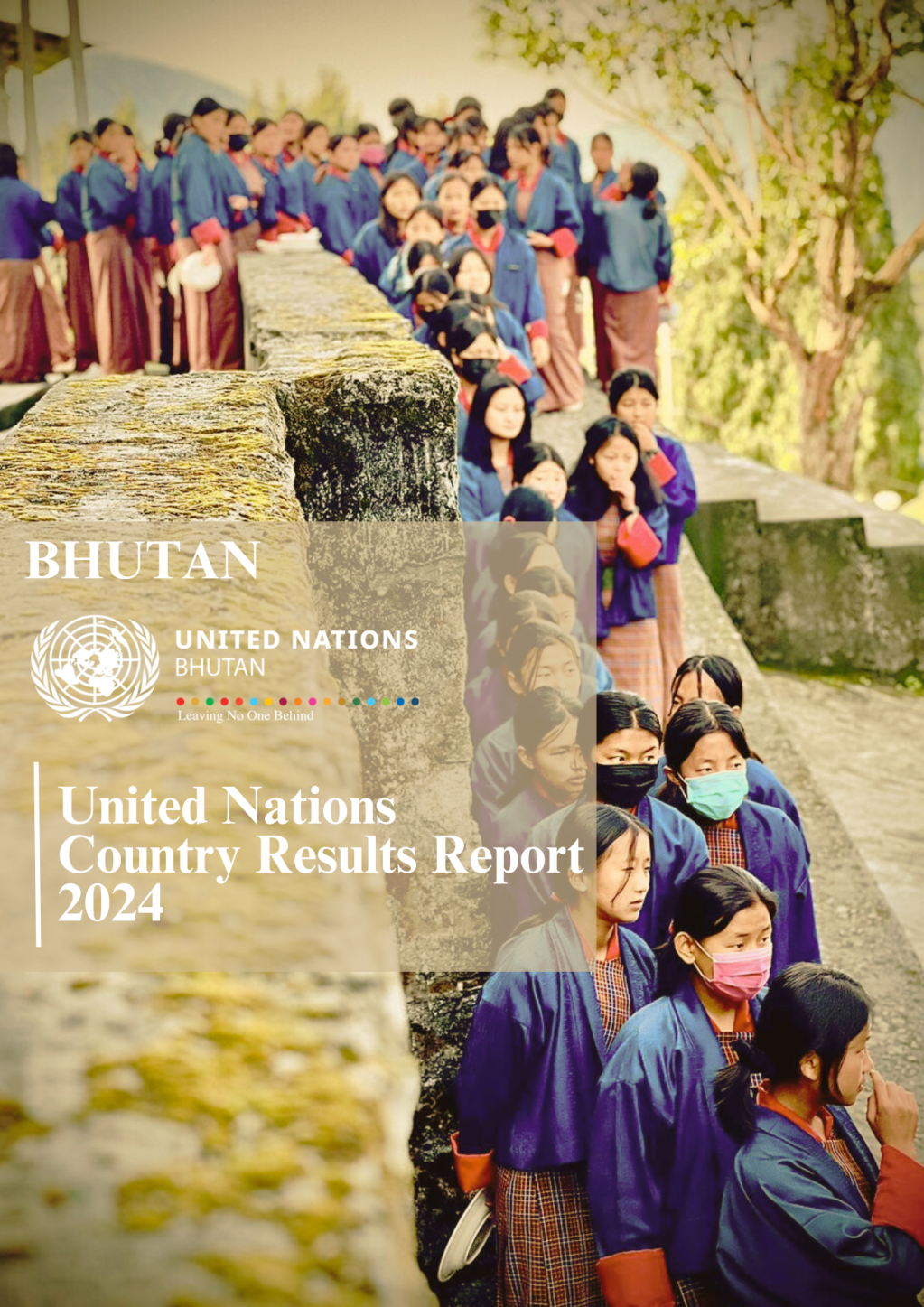
Video
22 May 2024
We the Women- Bhutan Chapter
Gender inequality remains a global challenge, impacting women and girls everywhere. It's time to change that!Introducing the "We the Women" campaign by the UN under #WomenRiseForAll, led by the Deputy Secretary-General. This powerful initiative amplifies women's voices, mobilizes action for gender equality, and invites YOU to join the movement.As we gear up for the Summit of the Future in September, Bhutan joined the world in creating a new narrative together with Bhutanese women- to share their thoughts, dreams, and aspirations.Launched in 2023, "We the Women" is about shaping global solutions and driving change. Ready to make a difference? Watch our video and follow our staff member Tshering Palden’s journey into Bhutan to join women from all walks of life- bringing them to join the global conversation.#WeTheWomen #GenderEquality #UN #WomenRise #SummitOfTheFuture
1 of 5
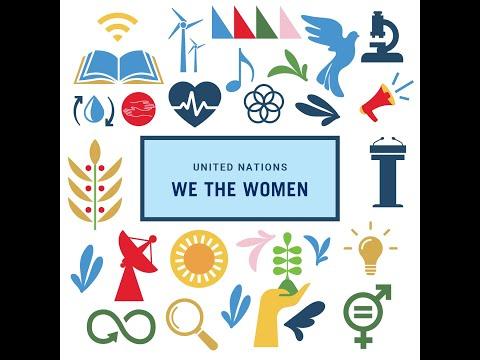
Story
07 November 2025
Bhutan SDG Partnership Week Day 3- Closing with Colour, Creativity, and Collaboration
The campus came alive with the SDG Fair, featuring interactive booths, a youth-led art exhibition, and community initiatives that brought the Sustainable Development Goals (SDGs) to life.Across the fairgrounds, students and partners demonstrated how local ideas can advance global goals. RENEW East hosted an engaging awareness booth on gender equality and ending gender-based violence, while Draktsho East and Muenselling School for the Blind displayed handcrafted textiles, eco-friendly goods, and artisanal products made by persons with disabilities, a powerful expression of inclusion and empowerment through economic participation. A highlight of the day was the “Colors of Equality” Art Drive, a collaborative art installation that invited students, artists, and community members to co-create five large canvases representing key facets of SDG 5: leadership, inclusivity, breaking barriers, shared progress, and empowerment. Together, they painted a vivid narrative of unity and equality, showing that progress is strongest when shaped by many hands and diverse voices. The President of Sherubtse College stated:“It is within our classrooms, our clubs, and our communities that young people learn not just to dream of a better world, but to build it — with knowledge, empathy, and purpose.”As the sun set over the eastern hills, the celebrations culminated in the SDG Concert — an evening of music and inspiration featuring Sherubtse’s student bands and popular Bhutanese artists, including Park Sonam, Pema Yangki, and Sangay Loday. The concert captured the spirit that defined the entire week: optimism, collaboration, and a shared commitment to building a more sustainable and inclusive Bhutan. Mr. Sonam Tobgay, President of the Sherubtse Forum for International and National Awareness (FINA) Club, stated: “Let us carry forward the knowledge and inspiration gained this week and translate them into meaningful action within our college, community, and beyond.” As Bhutan moves closer to 2030, the Bhutan SDG Partnership Week stands as a reminder that progress thrives on partnership- between youth and leaders, communities and institutions, people and planet. From the eastern heartland of Trashigang, one message rang clearly: together, we can turn ideas into action and partnerships into lasting progress, ensuring that no one is left behind.
1 of 5

Story
06 November 2025
Bhutan SDG Partnership Week Day 2- Youth Lead the Conversation on the SDGs at Sherubtse College
Under the theme “Turning Ideas into Action: Youth Driving the SDGs,” students, educators, and community members came together to explore how Bhutan’s youth are transforming awareness into tangible progress for the Sustainable Development Goals (SDGs).The day began with three dynamic panel discussions, each highlighting a different dimension of youth leadership.The first session, “We Are Not Just the Future; We Are the Now,” celebrated young changemakers who are leading local movements—from zero-waste initiatives and digital innovation to girls’ education and climate advocacy. The discussions reflected a growing sense of ownership among young Bhutanese who see themselves not as future leaders, but as active contributors shaping their communities today. Ms. Resham Subba, one of the panellists, stated: “Our panel discussion on “We are not just the future, we are the now” reminded us that youth are active changemakers, not passive inheritors. We explored how gender equality, climate change, and the SDG goals are all connected, and how our voices and actions today can shape a more just and sustainable world. Despite challenges, the discussion highlighted our collective power and responsibility to create positive change, starting now.” The second panel, “Voices We Don’t Hear Enough,” created a safe and inclusive space for open dialogue on mental health, disability inclusion, and social justice. Students shared deeply personal stories about resilience, identity, and belonging, reminding participants that inclusion begins with listening and empathy. Ms. Kezang Choden Namgyel, one of the panellists, stated: “The session allowed me to express my viewpoints on gender equality in a safe and respectful space, where I was truly listened to without the fear of being judged or targeted. Listening to my peers speak openly about the stereotypes and double standards they face was both eye-opening and empowering. It reminded me that many of us share similar struggles, even if our experiences differ. The discussion reinforced how important it is to create more such spaces where young people, especially women and marginalized voices, can speak freely, be heard, and be supported without hesitation.”The final discussion, “Think Global, Act Local,” showcased innovative student-led projects linking entrepreneurship with sustainability. From social enterprises to campus-driven green initiatives, participants shared how creativity and collaboration can drive economic growth that leaves no one behind. Mr. Jigdrel Kinley Namgyel, one of the panellists, stated:“The panel discussion made me realize how such discussion can enable one youth to encourage another. The vastness of perspectives from one person to another lets us rethink and learn much deeper than how we usually see. I would say overall the panel discussion opened my eyes wider into what a youth can do in innovation and SDG” In the afternoon, the focus shifted from conversation to community action with Hing Sang Sang Together — a campus-wide cleaning campaign that united students, faculty, and Kanglung residents. The initiative, first launched in Thimphu, translates to “United for a Clean Bhutan” . The activity reflected Bhutan’s long-standing values of environmental stewardship and civic responsibility, reminding participants that meaningful change begins close to home.As the day closed, Sherubtse College once again became a space of both dialogue and action, where ideas took shape through collaboration, and young voices reaffirmed their vital role in building a cleaner, fairer, and more sustainable Bhutan.
1 of 5
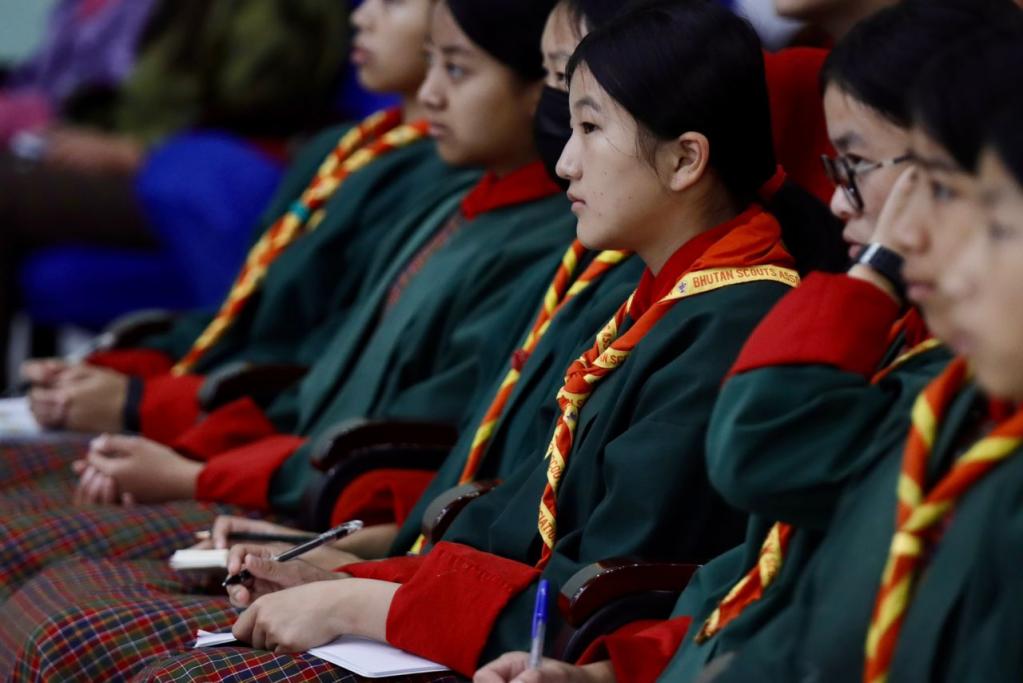
Story
24 October 2025
United Nations Day 2025: Eight Decades of Hope, Unity, and Action
At the UN House in Thimphu, the UN Country Team gathered to commemorate United Nations Day 2025 with a flag hoisting ceremony, reaffirming their shared commitment to peace, human rights, and sustainable development.The event began with the hoisting of the UN flag, symbolizing unity among nations and the enduring spirit of international cooperation. Mr. Timothy Wilson, Head of Office of the UN Resident Coordinator’s Office, read the UN Secretary-General’s message, which called on the world to stand together to confront global challenges “of staggering scale — escalating conflicts, climate chaos, runaway technologies, and threats to the very fabric of our institution.” The Secretary-General in his message said:“Now, more than ever, the world must recommit to solving problems no nation can solve alone... Let’s show the world what is possible when ‘we the peoples’ choose to act as one"The ceremony also included an oath-taking for new UN staff in Bhutan, marking their formal induction into the UN family. The event concluded with a cake-cutting and a butter lamp lighting ceremony at the Tara Lhaden Zhingkham Lhakhang in Pangrizampa, organized by the Ministry of Foreign Affairs and External Trade, symbolizing collective prayers for peace and well-being.As the UN turns 80, this year’s observance serves as a moment of reflection and renewal, a time to look back on the Organization’s achievements in promoting peace and prosperity, and to look ahead to the future envisioned by the 2030 Agenda for Sustainable Development, the Pact for the Future, and the UN80 initiative.In Bhutan, where Gross National Happiness remains the guiding vision of national development, the UN reaffirms its partnership with the Royal Government and the people of Bhutan in building an inclusive, resilient, and sustainable future, leaving no one behind.
1 of 5
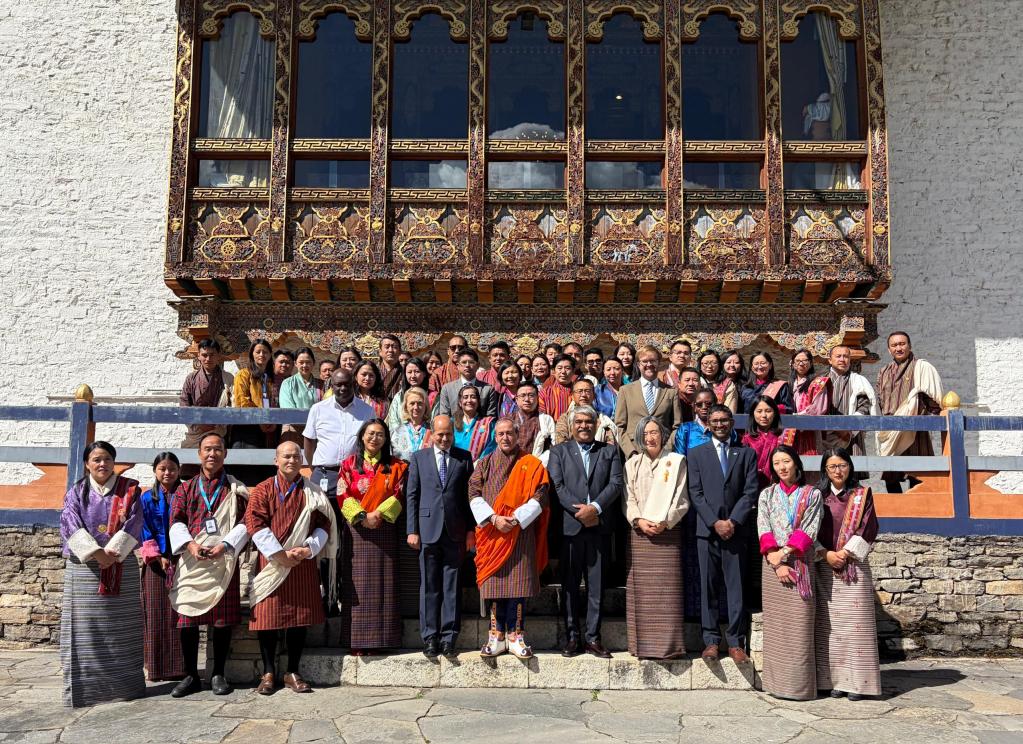
Story
23 September 2025
Meals of Change
In the highlands of eastern Bhutan, where nomadic Brokpa traditions run deep and access to basic services can be challenging, schools have become more than just places of learning. For many children, they are a second home, a source of nutrition, and a haven. In communities where families depend on herding yaks and sheep for survival, food security is never guaranteed. For many students, school lunch is their most reliable source of nutrition. That is where Bhutan’s National School Feeding Programme comes in, delivering daily meals that help children not only survive, but thrive. At Sakteng Lower Secondary School in Trashigang, this transformation is especially evident. Through the National School Feeding Programme, education is now deeply intertwined with health and well-being. “School feeding is vital in a place like Sakteng,” says Principal Sonam Jigme. “Children here receive the right kind of food, in the right amount, and food that helps them grow, focus, and thrive.” For families in this community, where herding yaks and sheep is the primary livelihood, food security can be fragile. Many children come from homes where meals are uncertain, especially during long transhumance journeys. For them, a warm school meal is the most reliable source of nutrition, and a compelling reason to stay in school. The impact of school feeding goes beyond nutrition. The programme is a powerful incentive for school attendance, especially for girls. With boarding facilities added to the school, girls who once stayed home to help with chores or were kept back due to safety concerns now have a secure environment to study and grow. “These meals are the reason many parents feel comfortable sending their children to school,” explains Principal Sonam Jigme. “It is not just food, it is trust, it is opportunity, and it is a lifeline.” For Sangay Dema, a student of Sakteng Lower Secondary School, the introduction of boarding facilities has brought a major shift, particularly for children from nomadic families who once stayed alone while their parents moved with the herds. “Before the hostel was built, I had to stay alone when my parents went with the herd,” said Sangay Dema. “Now, I stay in the hostel with my friends. We feel safe, we eat well, and we can focus on our studies.” The Principal of Sakteng Lower Secondary School, Sonam Jigme said School Feeding is important for a place like Sakteng where children are fed the right food with nutritious amounts and the right quantity. Meals are now fortified with essential vitamins and minerals, and menus are carefully reviewed and approved by the Ministry of Education and Skills Development (MoESD) with input from professional nutritionists. The impact has been clear, students’ health and ability to concentrate have significantly improved. Sonam Tenzin B, the school captain, shares how much the meals have changed school life. “My favorite dish is rice with lentils and boiled eggs,” he says with a smile. “When we eat well, we can think better. I have become more active in class and even have more strength to play basketball after school.” The power of Bhutan’s National School Feeding and Nutrition Programme extends far beyond the classroom walls. In remote villages like Sakteng, it is not just the students who benefit, in fact, the entire communities are feeling the positive ripple effects. For Tashi Yangzom, a mother of two, the school meals bring much-needed relief. This sense of security has reshaped how parents view schooling. It is no longer just an educational space but a crucial source of care and stability. As a result, more families are keeping their children in school, particularly girls, who now attend more consistently due to the safer, more supportive environment. For local farmers, the programme has opened new avenues for livelihood. Through local procurement initiatives encouraged by the Ministry of Education and Skills Development, schools source ingredients like vegetables, dairy, and eggs directly from farmers in the area, which helps to strengthen the local economy and build stronger links between the school and the community. A 2023 study comparing Body Mass Index (BMI) conducted by the Ministry between day and boarding school students validated these observations. The findings became the foundation for the launch of Menu+, an initiative that ensures higher standards in food quality and variety. “We formed a School Feeding Team to oversee food preparation, maintain standards, and ensure compliance with ministry guidelines,” Principal Sonam explains. “Our kitchen staff are trained to cook safely and hygienically.” With improved nutrition, Sakteng School has seen a measurable impact. Its School Performance Management System (SPMS) score rose from 92 to 94 in just one year. The boarding model also allows for structured extracurricular activities from aerobic dance to academic clubs, building well-rounded students who are more confident and engaged. The school also modernized the school kitchen, transforming it from a traditional, smoky structure into a bright, ventilated space with proper storage and safer working conditions. In essence, the National School Feeding Programme in Sakteng has become a cornerstone for community well-being, enhancing education, improving health, supporting livelihoods, and weaving tighter bonds between school and society. For many children in Bhutan’s highlands, school is more than a classroom—it is where their futures begin, one hot meal at a time. As Principal Sonam Jigme puts it: "It is not just food. It is trust. It is an opportunity. It is a lifeline.” In Sakteng, nourishing a child means nourishing a community and shaping a healthier, more hopeful Bhutan.
1 of 5

Story
15 August 2025
Building Inclusive and Safe Spaces: UN Bhutan Trains Staff and Partners on Disability, Gender, and PSEA.
The session brought together newly appointed UN staff, security personnel, hotel Long-Term Agreement (LTA) holders, and vehicle rental service providers to strengthen understanding of inclusive practices.Mr. Phuntsho Wangyel, UNFPA Bhutan Head of Office and Chair of the UN Bhutan Interagency Human Rights, Gender and Disability Inclusion Working Group, opened the meeting. He stated:“Disability equality is about listening, understanding their needs, aspirations, challenges, and creating inclusive environments and empowering them. Respect in words and actions matters, and understanding gender roles and intersectionality helps ensure equitable opportunities for all. Upholding these standards also means maintaining safe spaces. The UN’s zero-tolerance policy on sexual exploitation and abuse applies to everyone, making dignity a shared responsibility.”Disability Equality: Understanding Barriers, Building RespectFacilitators - including UN staff with disabilities and representatives from the Disabled People’s Organisation of Bhutan (DPOB) - guided participants through practical demonstrations on disability etiquette. For example, when supporting a person with blindness, participants were reminded to introduce themselves first, speak directly, offer their arm for guidance, and describe the environment clearly.The session also introduced the basics of Bhutanese Sign Language (BHSL) and highlighted communication challenges faced by the deaf community. Discussions on physical disability emphasised how exclusion often stems from societal and environmental barriers rather than impairment itself. Gender Equality and Intersectionality: Breaking Down StereotypesFacilitators unpacked key concepts on gender roles, stereotypes, and socialisation. Participants examined different models of equality — from formal equality, which treats everyone the same without accounting for differing needs, to protectionist approaches, which can unintentionally restrict opportunities.The training highlighted the value of a corrective approach that focuses on fixing barriers in the environment rather than expecting individuals to adapt. For example, instead of limiting opportunities for women, persons with disabilities, or other marginalised groups, the corrective approach ensures that workplaces, policies, and services are enabling and inclusive, achieving equality through equitable processes.Intersectionality was a core theme, showing how overlapping dimensions such as disability, gender, poverty, and geography can increase vulnerability. For instance, women with disabilities are more likely to face violence, while those from poor or rural backgrounds face additional challenges in accessing services.Addressing PSEA in All ContextsThe training also included a session on protection from sexual exploitation and abuse (PSEA), reminding participants of their shared responsibility to uphold the highest standards of conduct in all workplace and service delivery contexts. It was emphasised that the UN has a zero-tolerance policy on sexual exploitation and abuse. The UN in Bhutan only partners with LTA holders and service providers who commit to these standards in their agreements and daily practice.Building an Inclusive UN SystemBy the end of the day, participants gained greater awareness of disability as a human rights and equality issue, strengthened their understanding of gender and intersectionality, and committed to fostering safe and inclusive environments.Mr. Kinley Phyntso, UN UNV-LNOB Specialist, and one of the moderators of the training stated:“Inclusion, equality, and safety are fundamental rights - at work, at home, and in society. They are not privileges or charity, and they must be respected and upheld for and by everyone, regardless of gender or ability. We encourage each of you to consider how you can personally contribute to making this a reality.”This training contributes to advancing the UN Disability Inclusion Strategy (UNDIS) and the UN System-wide Action Plan on Gender Equality (UN-SWAP) in Bhutan, reinforcing the UN’s commitment to uphold equality, dignity, and inclusion in all aspects of its work.
1 of 5
Press Release
04 November 2025
Bhutan SDG Partnership Week 2025
Trashigang, Bhutan: The United Nations in Bhutan and Sherubtse College will organise the second annual Bhutan SDG Partnership Week from 5–7 November 2025. The event is a vibrant national platform to advance the Sustainable Development Goals (SDGs) through youth leadership, gender equality, and inclusive participation.The event marks a milestone in Bhutan’s sustainable development journey and coincides with the 80th anniversary of the United Nations, reflecting on global progress and reaffirming commitment to a more inclusive, peaceful, and sustainable future. Mr. Tshering Wangdi, President of Sherubtse College, stated“Sherubtse College is proud to host this national platform where young minds turn global goals into local action. Our students are learning not just to dream of a better world, but to build it—with knowledge, empathy, and purpose,” With less than five years remaining to achieve the 2030 Agenda, this year’s Bhutan SDG Partnership Week will focus on gender equality, highlighting the leadership and participation of women and girls as drivers of transformative change. Sport and cultural activities will also feature prominently, in line with the United Nations Pact for the Future, recognising sport and culture as catalysts for social cohesion, inclusion, well-being, and peace.Dr. Bhupinder Kaur Aulakh, UN Resident Coordinator a.i. highlighted “The next three days are more than a gathering of partners; they are a living testament to what Bhutan does best, bringing communities, institutions, and generations together to shape a shared future.”On the first day, the SDG Champions Parade and Ball Games will kick off the week, promoting teamwork, inclusion, and disability empowerment. Participants will march under banners representing the 17 SDGs.The second day will spotlight youth leadership through panel discussions addressing gender equality, climate action, education, and mental health. Young changemakers, particularly young women, will share their experiences and innovations in advancing sustainable development. The day will also feature the Hing Sang Sang Together – United for a Clean Bhutan campaign, mobilising students and local communities in Kanglung, Trashigang, for a hands-on environmental action.The week will conclude on the third day with the SDG Festival, an interactive space highlighting student-led initiatives, inclusive enterprises, and creative expressions of Bhutan’s journey toward the 2030 Agenda. Visitors can engage with educational booths, experience the Colors of Equality Art Drive, and witness a grand SDG Concert, celebrating culture, talent, and sustainability. The fair will also showcase products made by persons with disabilities, reinforcing Bhutan’s commitment to inclusion and economic empowerment.First launched in 2024 by Her Royal Highness Princess Eeuphelma Choden Wangchuck, President of the Bhutan Paralympic Committee, the Bhutan SDG Partnership Week is a national platform to celebrate and strengthen multi-stakeholder partnerships for the Sustainable Development Goals (SDGs). The event brings together government institutions, development partners, youth groups, civil society, the private sector, and academic institutions to collaborate for inclusive and sustainable progress. Ms. Jigme Wangmo, UN Club Coordinator of Sherubtse College, stated “The Bhutan SDG Partnership Week is a space where youth come together not just to learn but to lead. Every conversation, every action, and every shared idea brings us closer to a sustainable future.”Prime Minister Lyonchhen Dasho Tshering Tobgay has emphasised the importance of partnerships in driving Bhutan’s sustainable development, highlighting the alignment between Gross National Happiness and the SDGs.The Bhutan SDG Partnership Week 2025 is a testament to Bhutan’s commitment to building a society where no one is left behind, engaging youth, communities, and partners across sectors to drive inclusive and transformative change.
1 of 5
Press Release
19 August 2025
United Nations Calls for Youth Participation at Every Level
The Resident Coordinator of the United Nations in Bhutan, Karla Robin Hershey, stated“The United Nations is inspired by the ideas and energy of young people...Young people are pivotal in steering global progress. As torchbearers, they give us hope that we can put the world back on track towards achieving the Sustainable Development Goals.”The celebrations for International Youth Day will take place from 9-25 August in Thimphu. They are organised under the theme "From Clicks to Progress: Youth Digital Pathways for Sustainable Development." The celebration begins with a Hackathon at Gyalpozhing College of Information and Technology in Thimphu on 9 August, followed by other events. The pivotal role of youth in harnessing technology to advance sustainable development will be on display at the Hackathon run by the United Nations Development Programme (UNDP). The events also include a National Youth Symposium led by the Ministry of Agriculture and Livestock and Food and Agriculture Organisation (FAO), as well as a panel discussion on the UPSHIFT Programme, organised by the United Nations Children's Fund (UNICEF). The UPSHIFT programme empowers young people with a set of 21st-century skills to thrive in today’s modern world. The United Nations Population Fund (UNFPA) will also hold capacity-building initiatives on protecting against sexual exploitation, sexual abuse, and sexual harassment. The events take place in the build-up to the Summit of the Future, which will bring world leaders together to the United Nations Headquarters in New York to find new ways forward that safeguard the future and deliver a better present. “Next month’s Summit of the Future is an opportunity to build global problem-solving mechanisms that are more networked and inclusive,” states the Secretary-General of the United Nations, António Guterres. “I urge leaders to use the Summit to advance youth participation at every level, establish youth consultative bodies, promote intergenerational dialogue, and scale up funding opportunities for young people everywhere.
1 of 5
Press Release
10 August 2025
Bhutan Celebrates International Youth Day 2025 with a Focus on Local Youth Actions for the SDGs
This year’s IYD commemoration will bring the focus to Bhutanese youth as changemakers, mobilising them to engage in issues that matter most- climate action, gender equality, inclusive education, mental health, and innovation. The event will be youth-led and youth-designed, with a vibrant atmosphere featuring informative booths, live music, and most importantly, a space for reflection, open dialogue, and celebration. The event will see two Youth Dialogues:Dialogue I: We Are Not Just the Future; We Are the NowThis panel shines a light on young changemakers who are taking the lead in advancing the Sustainable Development Goals (SDGs) at the grassroots level. With a focus on SDG 4 (Quality Education), SDG 11 (Sustainable Cities and Communities), and SDG 13 (Climate Action), the dialogue will explore how youth are driving change in their communities—through climate advocacy, sustainable innovation, inclusive education efforts, and more. Panellists will share their real-life experiences and bold ideas, showing how young people are not waiting for the future to act—they’re already making an impact here and now. The session will highlight the power of youth-led solutions, the urgency of intergenerational collaboration, and the need to amplify youth voices in decision-making at every level.Dialogue II: Voices We Don’t Hear EnoughThe second panel discussion will centre on themes of inclusion, gender equality, and mental health, with links to SDG 5 (Gender Equality), SDG 3 (Good Health and Well-being), and SDG 10 (Reduced Inequalities). This dialogue will create a safe and open space for youth panellists to share personal stories and perspectives on stigma, identity, and access to support, particularly from the viewpoints of those who are often underrepresented or unheard.The event will also have a young digital entrepreneur share perceptions on how digital innovation can address development challenges in Bhutan. This short presentation will demonstrate the potential of tech-based solutions in a local context, with a focus on youth empowerment and job creation.As a special feature, the event will include a simultaneous watch party through livestreaming, allowing young people in remote schools across Bhutan to join the celebration in real time. This virtual participation will help expand the reach of the event, ensuring that youth voices and ideas are connected across regions and that students in rural areas can engage with the discussions, performances, and youth-led initiatives being showcased. Questions from these schools will also be entertained during the panel discussions.This event is organised by the UN Bhutan Adolescent and Youth Advisory Board, in collaboration with the UN Bhutan Youth Working Group and UN Bhutan Communications Group.
1 of 5
Press Release
08 March 2025
Bhutan launches National Strategy and Framework of Action to Eliminate Gender-Based Violence.
The strategy marks a milestone in Bhutan’s commitment to ending GBV, a major obstacle to achieving SDG 5 on Gender Equality and over 80 related SDG indicators. Developed by the National Commission for Women and Children (NCWC) in collaboration with United Nations Population Fund (UNFPA), United Nations Development Programme (UNDP) and United Nations Children’s Fund (UNICEF), the strategy provides a comprehensive roadmap for coordinated and sustained actions to combat GBV and ensure a violence-free Bhutan where Bhutanese women and girls live a life free from all forms of violence. According to a study on prevalence of violence against women and girls launched in 2019, two in five Bhutanese women experience one or more forms of partner violence, with 53.4% believing it is sometimes ‘justified.’ Childhood exposure to violence was also found to increase the likelihood of experiencing or perpetrating partner violence in adulthood. The strategy seeks to change the worrying status quo. Built on four pillars of Response, Prevention, Enabling Environment and Data and Evidence, the strategy adopts a comprehensive and inclusive approach to tackling violence against women and girls.The launch of this strategy is timely. This year marks the 30th anniversary of the Beijing Declaration and Platform for Action, a landmark blueprint for gender equality. Beijing+30 reflects on progress made and challenges ahead.The response pillar emphasises the establishment of accessible, high-quality, and comprehensive response services for all survivors of GBV by 2028, while the prevention pillar is centred around bringing a cultural and societal shift to promote zero tolerance of GBV and harmful practices through education, awareness and community engagement. The enabling environment pillar focuses on strengthening the policy, legal and institutional environment that prevents GBV and harmful practices. The data and evidence pillar pioneers a robust data collection and analysis system to inform and enhance programmes for preventing and responding to GBV and harmful practices. Quote from Dasho Kesang Deki, Chairperson, National Commission for Women and Children (NCWC):“Today marks a hopeful and transformative step towards a safer, more equal Bhutan. The launch of the National Strategy and Framework of Action on Elimination of Gender-Based Violence demonstrates our collective determination to protect the rights and dignity of all women and girls. While the prevalence of violence remains a challenge, we are confident that we can shift societal attitudes, strengthen legal frameworks, and ensure that every Bhutanese citizen lives free from violence. This strategy is not just a plan—it's a promise to future generations that we will create a society where gender equality and safety are the foundation of our shared values." Quote from Karla Robin Hershey, UN Resident Coordinator, Bhutan: "Ending gender-based violence requires more than policies and frameworks—it demands collective action, continuous advocacy, and a shift in mindsets to create a culture of equality, respect, and non-violence." – Quote from Andrea M. Wojnar, UNFPA Country Director:"The launch of the GBV Prevention and Response Strategy marks a critical step toward ensuring that all women and girls can live free from violence and exercise their rights and choices...This strategy strengthens collective efforts to prevent and respond to gender-based violence by fostering collaboration between government, civil society organisations, and front-line service providers, with survivors at the centre of these efforts."Quote from Mohammad Younus, UNDP Resident Representative: “Combating gender-based violence remains a critical area of our work in Bhutan...The National Strategy and Framework for Action to Combat GBV, which builds on our longstanding partnership with NCWC, is a blueprint to bring all stakeholders together for a more coordinated and holistic approach to tackling violence against women and girls. UNDP remains committed to supporting efforts to translate the strategy into tangible actions for a lasting impact.”Quote from Andera James, UNICEF Representative:“Evidence shows that Violence Against Women and Violence Against Children often coexist within households, share common risk factors, and can be addressed by preventing the root causes. This strategy will integrate our efforts to create a safer environment for both women and children. UNICEF is committed towards scaling up evidence-based prevention interventions for girls, boys, and women at greatest risk of violence, and strengthening access to response and support services to prevent recurrence and break the intergenerational cycle of violence.”
1 of 5
Press Release
10 December 2024
The PEMA Secretariat and UN Bhutan Partner to Address Sexual Exploitation and Abuse.
Effective from 10 December 2024 to 9 December 2025, this agreement underscores a jointcommitment to uphold the rights and dignity of individuals, particularly survivors of SEA,by adopting a human rights-based and victim-survivor-centered approach.UN Resident Coordinator for Bhutan and Coordinator for Prevention of SexualExploitation and Abuse (PSEA), Ms. Karla Robin Hershey, highlighted the importance ofthe partnership, stating:“This LoU represents a robust framework for establishing a referral pathway for allegationsagainst UN personnel and partners. Together with the PEMA Secretariat, we reaffirm ourdedication to accountability, transparency, and delivering comprehensive support to survivors of PSEA.” The PEMA Secretariat will serve as the primary point of contact for receiving SEA complaints through its helpline 1098 and other established channels. Complaints will be promptly communicated to the UN Bhutan Resident Coordinator and PSEA Coordinator to facilitate timely action. Survivors will be connected to essential services, ensuring their consent is at the forefront of all interventions. Dasho Dechen Wangmo, Head of the PEMA Secretariat, stated: “The PEMA secretariate is proud to partner with the United Nations in improving our sharedcommitment to proactively address allegations of sexual abuse and exploitation in workplace.The referral pathway will ensure that survivor receive timely support and care they deserve.”As part of the agreement, the PEMA Secretariat will serve as a community-based complaint mechanism for addressing complaints against UN personnel and partners, enhancing the efficiency and consistency of SEA responses across Bhutan. The United Nations in Bhutan will provide specialised training for the PEMA Secretariat’s complaint intake teams. The training will emphasise victim-survivor-centred methodologies and human rights-based approaches to SEA case management. The LoU paves the way for the development of shared training packages, regular consultations, and ongoing improvements to referral pathways. The partnership will strengthen Bhutan’s efforts to prevent and address SEA while reinforcing its commitment to human rights.
1 of 5
Latest Resources
1 / 11
1 / 11






















